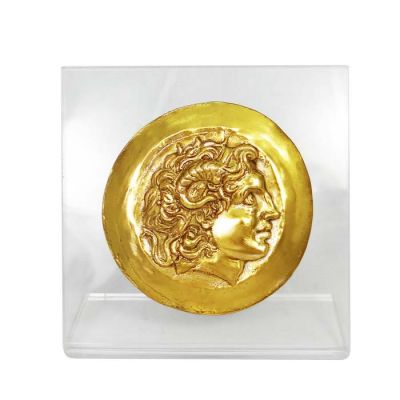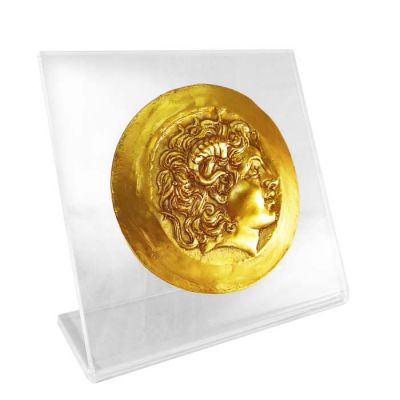We created a relief represantation that depicts Alexander the Great, inspired by the gold medal of Tarsus in Cilicia, dating to the middle of the 3rd century B.C.. The copy is made of copper with 24 carat gold plating and it is mounted on an acrylic back (plexiglass). An impressive work of art, that can decorate every corner of your home or your office.
Dimensions: 12cm x 12cm x 5cm
All prices include VAT.
Alexander III of Macedon (356 – 323 BC), commonly known as Alexander the Great, was a king of Macedon. He was the son of the king of Macedon, Philip II and his wife, Olympias. Born in Pella in 356 BC, Alexander was tutored by Aristotle until the age of 16. By the age of thirty, he had created one of the largest empires of the ancient world, stretching from Greece to modern-day Pakistan. He was undefeated in battle,due to use of terrain, phalanx and cavalry tactics, bold strategy, and the fierce loyalty of his troops and is considered one of history's most successful commanders.
Alexander died in Babylon in 323 BC. Alexander's legacy includes the cultural diffusion his conquests engendered. He founded some twenty cities that bore his name, most notably Alexandria in Egypt. Alexander's settlement of Greek colonists and the resulting spread of Greek culture in the east resulted in a new Hellenistic civilization, aspects of which were still evident in the traditions of the Byzantine Empire in the mid-15th century.
Alexander became legendary as a classical hero and he features prominently in the history and myth of Greek and non-Greek cultures. He took the Persian title "King of Kings" and was pronounced the new "master of the Universe" and son of the deity of Amun at the Oracle of Siwa Oasis in the Libyan desert. Alexander often referred to Zeus-Ammon as his true father, and subsequent currency depicted him adorned with rams horn as a symbol of his divinity. Alexander earned the epithet "the Great" due to his unparalleled success as a military commander.
The original medal is located in the Cabinet des Mèdailles at the National Library in Paris.
No posts found









